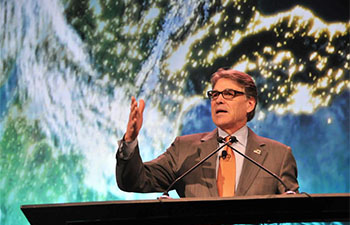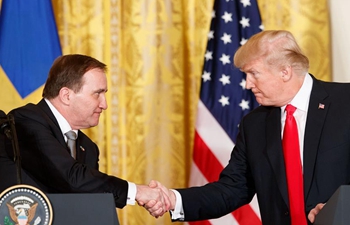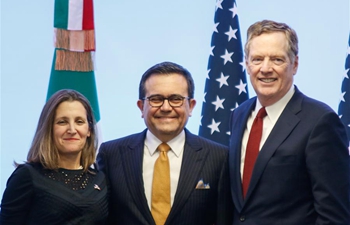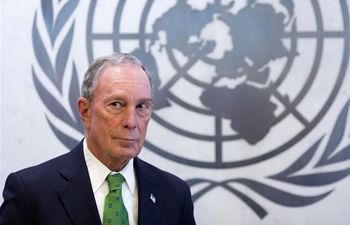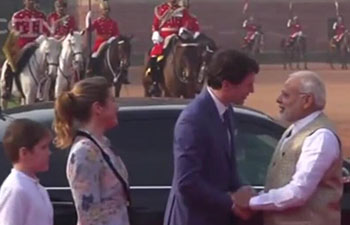WASHINGTON, March 9 (Xinhua) -- The planned meeting between the leaders of the United States and the Democratic People's Republic of Korea (DPRK) raised likelihood to denuclearize the Korean Peninsula, a positive signal welcomed by the parties concerned, while some experts still remain cautious about the prospect.
The White House confirmed Thursday that U.S. President Donald Trump has agreed to meet Kim Jong Un, top leader of the DPRK, in a couple of months at the invitation of Kim.
Kim, in an earlier meeting with a South Korean delegation to Pyongyang, has also pledged the denuclearization on the Korean Peninsula and to suspend nuclear or missile test, said visiting South Korean envoy Chung Eui-yong at the White House.
PLEDGE OF DENUCLEARIZATION
Kim said the DPRK "will refrain from any further nuclear or missile test," Chung, South Korea's top national security adviser, told reporters at the White House after briefing Trump on the outcome of his meeting with Kim.
Kim was also committed to the denuclearization, Chung added.
In his speech, Chung said "he (Kim) expressed his eagerness to meet President Trump as soon as possible."
"Trump appreciated the briefing and said he would meet Kim Jong Un by May to achieve permanent denuclearization," the South Korean envoy added.
The White House later confirmed that Trump has accepted the invitation to meet with the DPRK's leader in "a couple of months."
Trump himself expressed optimism about the message from Pyongyang. "Great progress being made but sanctions will remain until an agreement is reached. Meeting being planned!" he tweeted.
Washington has been pushing forward its "maximum pressure" campaign against Pyongyang mainly through economic sanctions and diplomatic isolation.
Chung also noted that Kim said he "understands that the routine joint -military exercises between the Republic of Korea and the United States must continue."
Signs of further detente on the Korean Peninsula have been detected as the DPRK made a tension-easing gesture during the two-day visit by the high-level South Korean delegation. Kim, for the first time since he assumed power, personally hosted a dinner for the South Korean delegation.
POSITIVE SIGNAL
China welcomed the positive news on direct dialogue released by the United States and the DPRK, Chinese Foreign Ministry spokesperson Geng Shuang said Friday.
Geng said it is a step in the right direction for the Korean Peninsula nuclear issue, and China fully commends and supports the efforts made by the parties concerned to solve the issue through dialogue and consultation.
To return the peninsula to peace and stability and the nuclear issue to the track of dialogue, these initial steps must be followed up with corresponding and concerted efforts by the parties, Geng said.
China's suspension-for-suspension proposal has proven to be a right prescription for the problem in creating the basic conditions needed for improving inter-Korea relations, Chinese Foreign Minister Wang Yi said earlier.
Moscow also welcomed the possible meeting as it is needed for the settlement of the nuclear crisis on the Korean Peninsula, Russian Foreign Minister Sergey Lavrov said Friday.
"It shouldn't end up with a talk only, but pave the way to a comprehensive political dialogue aimed at the settlement of nuclear problem on the Korean Peninsula based on the principles approved at the six-party talks and in the UN Security Council," Lavrov said.
South Korean President Moon Jae-in said Friday that the agreed-upon summit between Trump and Kim will become a "historic milestone" for peace on the Korean Peninsula.
"The two leaders' meeting following the inter-Korean summit will put the complete denuclearization of the Korean Peninsula finally on track and will be remembered as a historic milestone which will contribute to achieving peace on the peninsula in the future," said Moon.
Japanese Prime Minister Shinzo Abe on Friday also hailed the "change" in the DPRK's stance, saying that the shift was evident in its decision to "begin dialogue on the basis that it will denuclearize."
BETTER TO TALK
If the arrangement goes smoothly, Trump will be the first sitting U.S. president to meet with a DPRK leader.
Given the past history of the talks between Washington and Pyongyang as well as the exchanges of words of insults between Trump and Kim over the past year, hope has been raised about the planned meeting amid caution or even skepticism.
U.S. Senator Lindsey Graham believed that the United States now has "the best hope in decades to resolve this threat peacefully."
"Expectations should be low and history demonstrates that skepticism and careful diplomatic work are necessary, but it is better to be talking about peace than recklessly ramping up for a war," tweeted Senator Brian Schatz, a Hawaii Democrat.
Senator Edward Markey reminded Trump that the meeting will just be "the beginning of talks between the nations, not a conclusion."
"The president must abandon his penchant for unscripted remarks and bombastic rhetoric to avoid derailing this significant opportunity for progress," said the long-standing nuclear-disarmament advocate in a statement.
"And if the talks between the two leaders do not go well, it is not an excuse to justify military action for a situation that has no military solution," Markey added.
Daniel Morgan, a U.S. Army fellow at the Council on Foreign Relations, a New York-based think tank, said the U.S. military is a "war-ready force," but the optimal U.S. strategy with regard to Pyongyang would emphasize diplomacy and the long-term goal of denuclearization.








